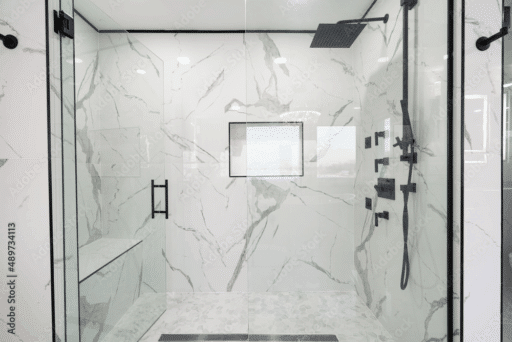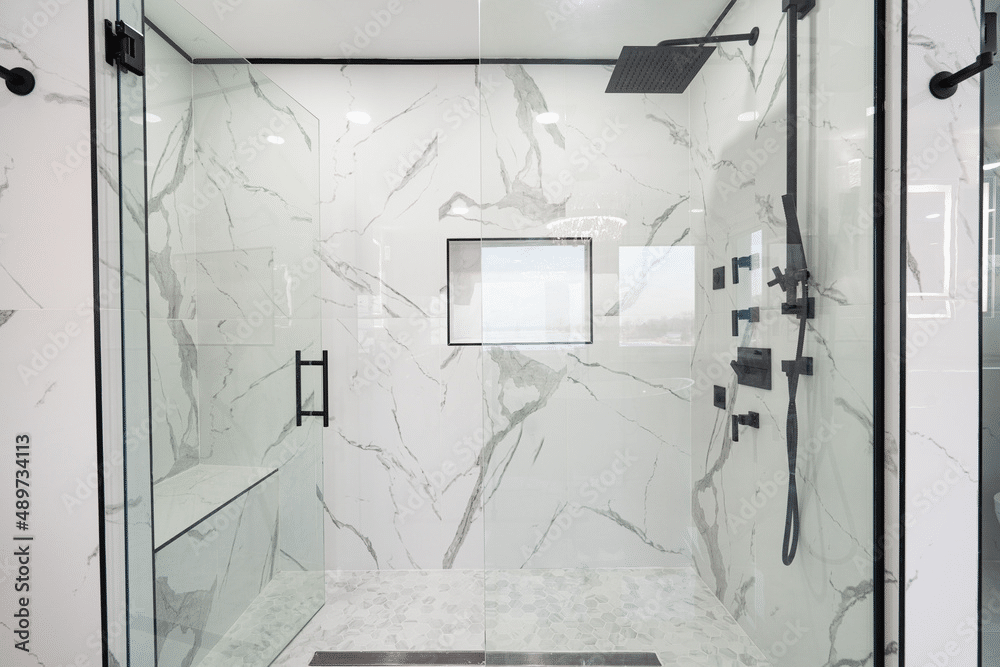As interest in connected living continues to rise, smart showers are becoming a practical and appealing choice for modern bathroom renovations.
Smart shower systems combine technology and design to offer a level of control, comfort, and sustainability that traditional showers simply can’t match. From setting the perfect temperature to starting the shower remotely from your phone, these innovations are changing how people think about their daily routines.
In this blog, we’ll break down the top reasons why smart shower systems are becoming a must-have in bathroom remodels. Here’s a clear look at the unique benefits driving this trend.
1. Built-in Safety Features Reduce the Risk of Burns
Smart shower temperature control allows users to set an exact water temperature and maintain it throughout the shower. Instead of adjusting knobs or waiting for the water to stabilize, users can select their preferred temperature through a digital interface or app in order to get the same experience every time.
This level of control is especially helpful in households with multiple users. Smart showers also include safeguards that prevent sudden temperature spikes, such as anti-scald protection, which adds an extra layer of comfort and safety for families with children or elderly members. Some models also offer shutoff timers and maximum temperature settings that help prevent overheating and reduce the risk of injury during everyday use.
These features matter more than most people realize. According to the American Burn Association, 34% of all burn injuries from 2007-2017 were due to scald burns. Young children and aging adults face the highest risk, with up to 85% of scald burns happening at home, often in the shower, as a result of uncontrolled water temperature and delayed reaction time.
By limiting temperature fluctuations and reducing the need for manual adjustments, smart showers help prevent accidents before they happen. Bathroom design plays a bigger role than you think, especially when it protects the people who use the space the most.
2. Reduced Water and Energy Consumption
One of the most practical benefits of smart shower systems is their ability to reduce water and energy consumption. By offering features like timers, usage tracking, and flow regulation, these systems encourage more efficient use without requiring users to change their routines drastically.
A well-known study by ETH Zurich, a public university in Switzerland, tested this concept by installing smart shower meters that provided real-time feedback on energy and water usage. Participants who received live data during their showers reduced their energy consumption by 22% compared to a control group that received no feedback. The savings came primarily from shorter shower durations, as users became more conscious of their habits when presented with visual feedback in the moment.
What makes this finding important is that the behavioral change occurred without any financial incentive. The mere presence of real-time information was enough to prompt users to take shorter showers and conserve energy, proving that smart feedback tools can drive meaningful savings over time.
3. Better Accessibility for a Wide Range of Users
Creating a more accessible bathroom isn’t just about getting the layout right or choosing the perfect shower size. It also means reducing the physical effort required to use everyday fixtures. Smart shower systems help with this by making it easier for users with limited mobility to turn knobs, reach for controls, or make temperature adjustments.
Some systems take this a step further by adapting to the user’s physical abilities in real time. For instance, researchers have developed an assistive shower system that uses wearable sensors to classify the user into one of three categories—healthy, slow-walking, or wheelchair-bound—and then adjusts water temperature, spray angle, and controls accordingly. This makes the shower easier and safer to use without requiring any manual setup.
Another automated shower system developed by researchers makes use of voice recognition to let users control water temperature and showerhead positioning through spoken commands alone. It’s designed to support persons with physical disabilities but also helps anyone who wants a more accessible and hands-free experience, such as someone recovering from an injury or a parent carrying a child.
While these systems were developed with specific needs in mind, their usefulness has direct applications for both personal homes and public spaces. In Bellevue, Kitchen & More, a local kitchen and bath remodeling company, has seen a growing number of clients request smart, connected features when planning a modern bathroom remodel. This suggests that more homeowners are thinking about long-term usability when remodeling. As people spend more time at home, they’re choosing technology that simplifies their daily routines and reduces friction in how their space is used.
4. Personalized Controls That Adapt to Your Preferences
Touchscreen shower controls make it easy to set and save your ideal water temperature, spray mode, and flow rate. Instead of adjusting the settings every time, users can create custom presets and switch between them instantly with just a few taps. This means each person in the household can enjoy their preferred shower experience without having to reset everything manually each time.
Some systems also allow profiles to be linked to family members or times of day, streamlining busy routines. For instance, you could set a quick, energizing spray in the morning and a longer, gentler setting at night. This kind of personalization helps conserve water and reduce wait times, especially in shared bathrooms.
Touchscreen shower control panels make these features easy to navigate, even for first-time users. With simple menus, visual feedback, and intuitive layouts, adjusting or switching between saved settings becomes second nature.
5. Tech That Looks as Good as It Performs
Unlike traditional setups with bulky valves and exposed plumbing, smart shower systems often feature slim control panels, clean lines, and wall-mounted components that blend into the surrounding tile or stone. Many models use a touchscreen shower control that stays dark until activated, giving the wall a seamless, high-end appearance when not in use.
These design choices aren’t just for show. Flush-mounted fixtures, minimal hardware, and digital interfaces reduce visual clutter and make the space feel larger. These features are especially valuable in smaller bathrooms where every inch of space matters.
Homeowners looking for a spa-like environment often choose smart showers for this reason: the interface feels sleek, the surfaces stay cleaner, and there’s nothing to distract from the overall design concept. In newer homes and high-end remodels, smart showers are now being treated as design features in their own right. This design approach reflects a growing shift in bathroom design, where tech-forward features also serve an aesthetic purpose.
6. A Smarter Fit for Sustainable Living
Eco-conscious homeowners aren’t just looking to cut costs. They want long-term solutions that align with their values. Smart shower systems support this goal by helping users track and manage their environmental impact more deliberately.
Beyond reducing energy and water consumption, many modern shower systems now offer detailed usage reports, customizable conservation settings, and app-based dashboards that let homeowners monitor their habits over time.
For example, Orbital Systems has developed closed-loop shower models that may reduce water use by up to 90% by filtering and recirculating clean water in real time. Products like Hydrao include built-in LED indicators tied to water usage thresholds, and their companion app can help users monitor consumption trends over time. In homes equipped with solar water heating, some advanced automation systems, such as Control4 or Home Assistant, can potentially coordinate hot water delivery based on solar output, potentially helping to reduce reliance on traditional heating.
These features are more common in custom or premium builds, but their appeal is growing across a wider segment of homeowners as interest in sustainable living grows.
Ready to Equip Your Bathroom with a Smart Shower?
Smart shower systems are no longer just luxury add-ons; they’re becoming a central part of how homeowners approach comfort, sustainability, and design. Whether you’re interested in precise temperature control, voice-activated convenience, reduced water waste, or a cleaner, more modern look, these systems offer practical benefits that go well beyond aesthetics.
As technology continues to evolve, smart showers are quickly becoming a natural choice in bathroom remodels. If you’re planning your own upgrade, now is the time to explore options that match your lifestyle and long-term goals. For more practical tips and ideas on modern home upgrades, explore our content at Enthralling Gumption.








